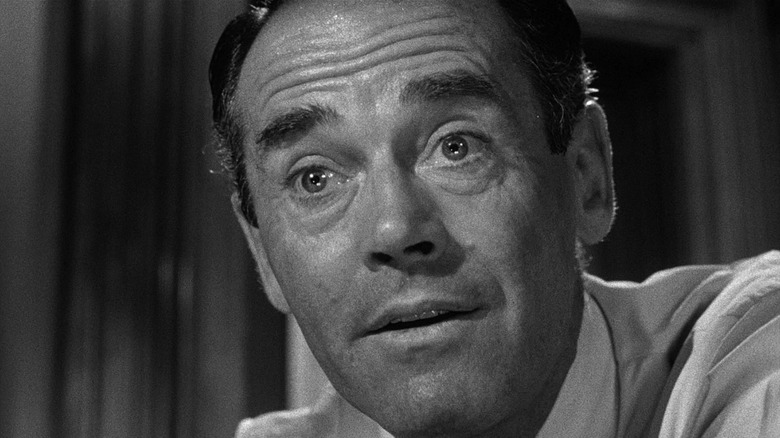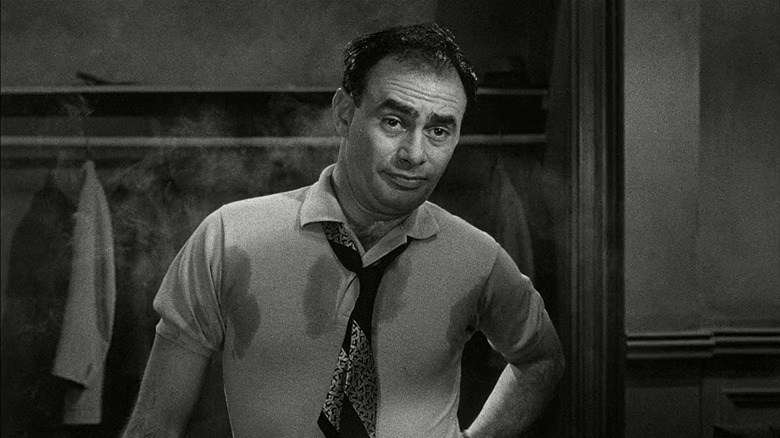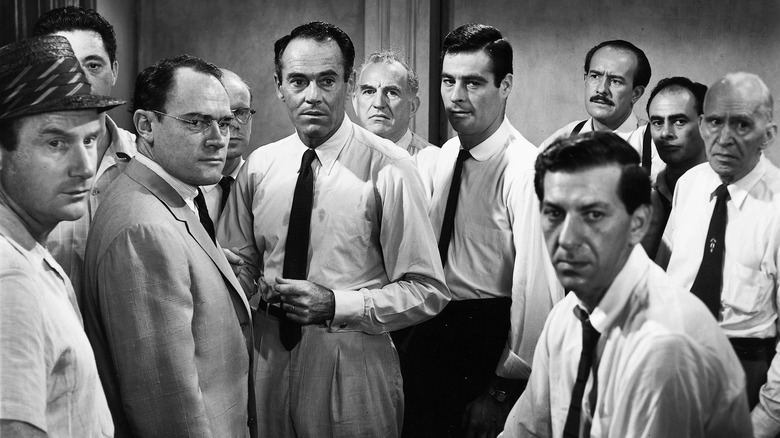The Studio's Grand Ambitions For 12 Angry Men Set Henry Fonda Up For Failure
It's common practice for actors to double as producers on their star vehicles. Sometimes a film needs the backing of a star to get made or the actor just wants to make sure their passion project goes right. The downside to this is that if the film fails, then the blowback on the actor is all the worse. Henry Fonda learned this lesson on the sole film he produced, and the experience is why he never did so again. That film was none other than "12 Angry Men."
A classic courtroom drama and the feature debut of director Sidney Lumet, "12 Angry Men" features jurors weighing the fate of a boy accused of killing his father. Fonda, the lone movie star among a sea of character actors, plays Juror #8, the only one unconvinced of the defendant's guilt. The drama of the film comes from him trying to sway 11 other men's minds.
While it's remembered as a masterpiece today, "12 Angry Men" took time to find its audience, or any audience for that matter.
Modest dreams, bigger ambitions
Henry Fonda recounted the release of "12 Angry Men" in "Fonda: My Life" (co-written with Howard Teichmann). According to Fonda, he, Lumet, and screenwriter Reginald Rose all knew they "had something special when [they] saw the first rough cut." Still, their initial plans were modest. Fonda recounts:
"We dreamed of putting it into a small East Side movie house, the kind that held a few hundred people at the most, and we hoped that word of mouth would spread just as it had built with Paddy Chayefsky's Marty."
"Marty," released by "12 Angry Men" distributor United Artists in 1955, had opened at the Sutton, an arthouse theater in New York with 500 seats. As Phil Rosenzweig recounts in "Reginald Rose and the Journey of 12 Angry Men," the film played there for 6 more months and by the end, it had earned $2 million in domestic returns and $1.5 million internationally.
Even today, staggered release roll-outs are common for all but blockbusters: movies typically open in large cities, especially the cultural centers of New York City and Los Angeles, then go wide once word of mouth has been spread. However, United Artists heads Arthur Krim and Bob Benjamin had other plans. Bawled over by the picture and convinced it would be a money-maker, they wanted a wide release for "12 Angry Men" across the country.
When Fonda asked for time to consider the idea, Krim responded: "Are you out of your ever-loving mind? All you'll have to do is sit back and hire people to take the wheelbarrows of money to the bank." Teichmann and Fonda write that the latter agreed since United Artists had funded "12 Angry Men." Unfortunately, Krim and Benjamin's plans wound up demonstrating why you don't immediately go to wide release.
Belated success
"12 Angry Men" wound up debuting at a much larger theater than the Sutton. Fonda recounts the film's premiere and the venue in "My Life":
"The Capitol Theater was Loew's flagship in New York. It's been gone for some time now, but in case anyone's forgotten, it had over forty-six hundred seats. The opening day 12 Angry Men barely filled the first four or five rows. They pulled it after a week."
By 1958 (per "Reginald Rose and the Journey of 12 Angry Men"), the film had only seen a return of $1 million against a budget of $337,000. Fonda was embarrassed by this turn of events and it's why he swore off producing again. Despite this, there was a light at the end of the tunnel.
Critics were on the side of "12 Angry Men." A.H. Weiler of The New York Times wrote, "These '12 Angry Men,' are all right without distaff glamour. Their dramas are powerful and provocative enough to keep a viewer spellbound." The film was also nominated for three Academy Awards, though it ultimately went home empty-handed.
The true savior of the film was Europe. At the 1957 Berlin Film Festival, Sidney Lumet and "12 Angry Men" were bestowed the highest honor of a Golden Bear. It was also voted the "Best Foreign Film" by Italian Critics (per Variety). The overseas success of "12 Angry Men" speaks to not just the power of the story, but also of a staggered rollout.


